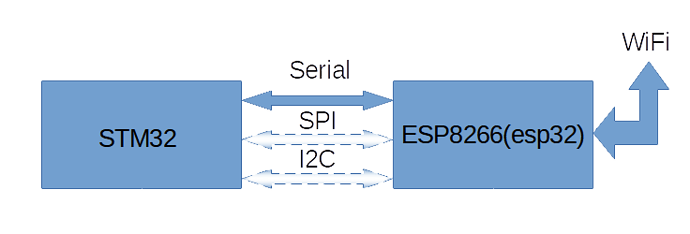I want the blynk to work on STM32, and ESP8266 to work in a transparent mode for transport of a blynk stream.
Communication between microcontrollers can be on any bus: Serial, I2C, SPI, etc …
Code that works on STM32:
#include <Arduino.h>
#include <BlynkSimpleStream.h>
HardwareSerial Serial2(PA3, PA2);
// You should get Auth Token in the Blynk App.
// Go to the Project Settings (nut icon).
char auth[] = "*************************";
void setup()
{
// Blynk will work through Serial
// Do not read or write this serial manually in your sketch
Serial2.begin(9600);
Blynk.begin(Serial2, auth);
}
void loop()
{
Blynk.run();
}
Code that works on ESP8266:
#include <Arduino.h>
#include "ESP8266WiFi.h"
#include <BlynkSimpleStream.h>
byte bufRX;
byte bufTX;
const char* ssid = "TP-LINK_XXXXX";
const char* pass = "**********";
WiFiClient wifiClient;
// This function tries to connect to the cloud using TCP
bool connectBlynk()
{
wifiClient.stop();
return wifiClient.connect(BLYNK_DEFAULT_DOMAIN, BLYNK_DEFAULT_PORT);
}
// This function tries to connect to your WiFi network
void connectWiFi()
{
if (pass && strlen(pass))
{
WiFi.begin((char*)ssid, (char*)pass);
}
else
{
WiFi.begin((char*)ssid);
}
while (WiFi.status() != WL_CONNECTED)
{
digitalWrite(2, !digitalRead(2));
delay(500);
}
}
// This function is used by Blynk to receive data
size_t BlynkStreamRead(void* buf, size_t len)
{
return wifiClient.readBytes((byte*)buf, len);
}
// This function is used by Blynk to send data
size_t BlynkStreamWrite(const void* buf, size_t len)
{
return wifiClient.write((byte*)buf, len);
}
void setup()
{
Serial.begin(9600);
connectWiFi();
connectBlynk();
}
void loop()
{
// Reconnect WiFi
if (WiFi.status() != WL_CONNECTED)
{
connectWiFi();
return;
}
// Reconnect to Blynk Cloud
if (!wifiClient.connected())
{
connectBlynk();
return;
}
if (Serial.available() > 0)
{
Serial.readBytes(&bufTX, 1);
BlynkStreamWrite(&bufTX, 1);
}
if (wifiClient.available() > 0)
{
BlynkStreamRead(&bufRX, 1);
Serial.write(&bufRX, 1);
}
}
It works great.
But I want to ask:
- Is it optimal to redirect blynk packets this way? 1 byte is sent here. Is it possible to somehow make a whole package, so that in the future it would be appropriate to use DMA? Do I need to separate the buffer for TX and RX?
if (Serial.available() > 0)
{
Serial.readBytes(&bufTX, 1);
BlynkStreamWrite(&bufTX, 1);
}
if (wifiClient.available() > 0)
{
BlynkStreamRead(&bufRX, 1);
Serial.write(&bufRX, 1);
}
- On STM32 the blynk stream is sent to the Serial2, or to the wire bus, all that supports a simple stream.
Blynk.begin(Serial2, auth);
Is it possible to send a blynk stream to the program buffer? So that I can then wrap the stream from the buffer in my wrapper and then send that modified stream to the serial2 or wire bus? I can’t figure out how to do it instead of Blynk.begin (Serial2, auth); there was something like Blynk.begin (buffers, auth); where buffers is the buffer for the stream: Stream buffers(buf); <- but it doesn’t work, I don’t know how to declare the program buffer as a stream.
help please!
